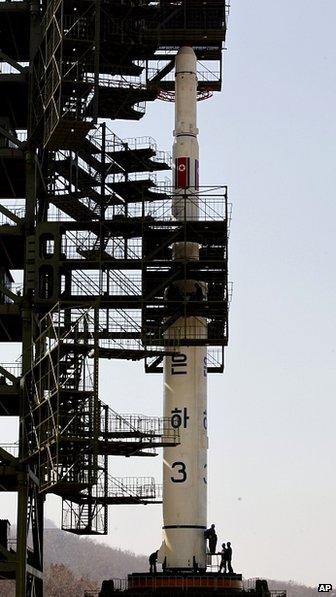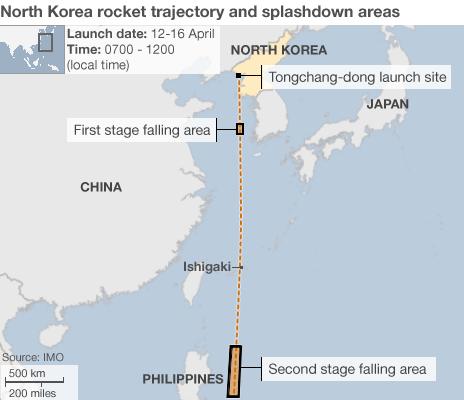North Korea launch casts doubt on improving relations
- Published

North Korea says the rocket, scheduled for launch between 12-16 April, will put a satellite into orbit
North Korea's planned rocket launch over the next few days casts doubt on hopes for an agreement on its nuclear programme, but there is little chance it will back down.
In Japan surface-to-air missile batteries are on alert.
Japanese, South Korean and Philippine Airlines flights are being diverted away from the danger area and both the Philippines and South Korean authorities have warned fishing boats to avoid waters where debris from the North Korean rocket launch might fall.
This represents the first international crisis since the new North Korean leader, Kim Jong-un, took office.
It risks dashing all hopes that his new leadership might offer the chance for better relations between Pyongyang and the outside world.
China, Russia, the United States and a host of other countries have urged the North Koreans to abandon their rocket launch which Pyongyang says is intended to lift a satellite into orbit.
Experts believe that there is little chance of the mission being cancelled.
"According to North Korean spokesmen the missile launch was ordered by the late Kim Jong-il last year, before he died," says Mark Fitzpatrick, director of the Non-Proliferation and Disarmament Programme at the International Institute for Strategic Studies in London.
"Given the public connection to the late leader and the significance of the launch on the centenary of Founding Father Kim Il-sung's birth, there is no way for North Korea to back down without huge loss of face."
He adds: "The launch is important to North Korea militarily because past test launches have all been failures. The military wants to make sure that it has a longer-range missile that works."
But the launch, argues Mr Fitzpatrick, "is even more important politically".
"For years," he says, "North Korea has proclaimed that this month's centenary would usher in an era of 'prosperity and power' for the nation.
"With the economy unable to escape the chronic impoverishment induced by central planning and misallocation of resources, the missile launch is the only thing the regime can use to demonstrate the 'power' part of the pledge."
By launching a rocket into space, North Korea will be breaking two UN Security Council resolutions demanding that it halt all missile tests.
Atop the missile
This is indeed all about rocket science. For the technology for this space launch is mostly identical to that employed in North Korea's ballistic missile programme. This includes the engine, the missile frame, and the three-stage separation technology.
"The main difference," says Mr Fitzpatrick, "is what sits atop the missile: in this case presumably a satellite rather than a warhead."
He says: "This launch won't help North Korea ensure that it can protect a nuclear warhead from the heat and buffeting of atmospheric re-entry.
"But the launch will help North Korea significantly in its programme to develop a long-range ballistic missile for military purposes."
What is even more worrying for many observers are the indications that North Korea may be planning to follow-up the satellite launch with another nuclear test.
Mr Fitzpatrick has no doubt that North Korea is also preparing another nuclear test, although, he says, it may come later in the year.
"Its previous two nuclear tests were only partially successful, so the military leaders will want another test to ensure reliability.
"As in 2009, the missile launch will result in global condemnation, which Pyongyang will then cite as an excuse for another provocation, this time in the form of a nuclear test."
Limited outside influence
So where does this leave international efforts to contain North Korea and to try to roll-back its nuclear programme?
In disarray is probably the only reasonable answer. The US had been hoping to build on a North Korean offer to suspend some of its nuclear activities in return for food aid, to encourage Pyongyang back to the negotiating table. But if the launch goes ahead food aid will be out of the question.
Conservative voices in the US have criticised the Obama administration's whole approach towards North Korea - there is of course a US presidential campaign under way.
But the ability of outsiders to influence Pyongyang remain limited. This crisis underscores that even China's capacities in this respect are often much over-stated.

- Published9 April 2012
- Published8 April 2012
- Published10 August 2017
 Tour of mission control HQ
Tour of mission control HQ
 'Nothing quite as it seems' in N Korea
'Nothing quite as it seems' in N Korea
 Inside the rocket launch site
Inside the rocket launch site
 Rally for founding father Kim Il Sung
Rally for founding father Kim Il Sung